Egypt has historically been one of the most stable countries in the Middle East. Today, after the failed 2011 “Arab Spring” and shake-up of official power, Egypt’s economy is crippled. The tourism industry is dead. Many other vital sectors are in a bad shape, like electricity and gas. Half of the population is on or below the poverty line.
Not surprisingly, ISIS has made inroads. Ansar Bait al-Maqdis (or ABM), the main insurgent group in Egypt, declared allegiance to ISIS earlier this month, and Egyptian affairs experts fear that Egypt is descending into the kind of violence that has crippled state authorities elsewhere. Not only that, Egypt’s influence in the region and its position as a staging ground for Holy Land attacks makes this substantially different than the ISIS targeting of fringe areas.
“The gradual escalation of violence in Egypt, and particularly in Northern Sinai, is extremely concerning and could herald a new chapter of violent internal conflict for a country that has hitherto been largely peaceful,” said Dr. Nussaibah Younis, a senior research associate at Project On Middle East Democracy.
Related: Path to Jihad—From Upscale Cairo to ISIS Beheadings
Egypt is the leading country in the Arab world and a major country in both the Islamic world and Africa. When the Free Officers took over Egypt in 1952, similar movements emerged in Iraq, Yemen and Libya. When Egypt’s Nasser leaned to the left, most of the Arab world did as well. When he fought Israel, many other Arabs followed. When Egypt agreed on peace with Israel, others eventually did, too. If Egypt is rocked by Islamic extremism, shock waves will sweep the entire Middle East.
Last October, 31 Egyptian soldiers and police officers were killed in a single day. Sinai governorate of the Islamic State declared its responsibility for the attack in a graphic video. In the same month, three people were beheaded by the militants after being accused of spying for Israel. Early in November, eight navy sailors went missing after an attack in the Mediterranean Sea. These events forced the government to declare a state of emergency in Sinai, impose a nighttime curfew, and evacuate the population in the border with the Gaza strip to build a security zone.
“In October 2014 alone the ABM group is believed to have carried out a dozen attacks against Egyptian security forces…. Their recent pledge to join ISIS is expected to give them the resources necessary to expand the insurgency,” said Jacob Kennedy, an intelligence analyst at AIG - Global Security Operations Center. “Ajnad Misr, a Giza-based Salafist militant group, has claimed responsibility for over a dozen attacks in Cairo and Giza in 2014 and has allegedly worked with ABM. The Arab Gas Pipeline has been blown up nine times this year,” Kennedy, said.

While Egypt is facing a surging rebellion in its eastern border, another threat is escalating from the west. “Egypt faces a low-level but potentially combustible security situation on its Western border with Libya, which has become one of the world’s biggest open-air arms markets. In July, Libyan militants killed 21 Egyptian border guards manning the frontier between the two countries,” said Oren Kessler, deputy director of research at the Foundation for Defense of Democracies.
Related: The Coup in Egypt—a Greater Failure than Morsi
Like other countries emerging from a long dictatorship, Egypt came to realize that it was one thing to get rid of an unscrupulous ruler and another to reform a society that was crippled by decades of mismanagement and corruption. The overpopulation, combined with high exposure to the information revolution, the lack of jobs to satisfy angry young Egyptians, and the highly organized Islamic groups led to the dominance of the Muslim Brotherhood on the political life in post Mubarak’s Egypt.
It is hard to believe that the country that produced one of the greatest peaceful pro-democracy revolutions in modern history in January and February 2011 has unraveled within three years into an ISIS-inspired insurgency and another dictatorship. “Authoritarianism under the command of a strong executive, which we may refer to as a 'Pharaoh Syndrome,' seems to be a hallmark of Egypt's leaders in the modern era,” said Nicholas A. Heras, a Middle East researcher at the Center for a New American Security, Washington DC.
THE "PHARAOH SYNDROME" SEEMS TO BE A HALLMARK OF EGYPT'S LEADERS IN THE MODERN ERA
Egypt, the North African nation of 87 million people, the most populous in the Arab world, has been in turmoil. The government changed hands from President Mubarak in February 2011 to the army. Then it went to Mohammed Morsi, the first-ever elected civilian Muslim Brotherhood president in 2012, to General Sisi, the army chief, in a widely popular coup in July 2013.
Mohammed Morsi’s regime was a turning point in Egypt’s history. After winning the presidential and the two house parliamentary elections, the Egyptian Muslim Brotherhood, the mother organization of the largest and the oldest Islamic party in the Arab world, managed to alienate everybody in Egypt with its authoritarian style of governance, including youth, women, the left, the army, the judiciary, the Nassirists, the media, the Christians, the other opposition parties, the former regime loyalists, al-Azhar and even the Islamic Salafists.
Related: The Merger of ISIS and al-Qaeda Could Cripple the Civilized World
A constitution was drafted and ratified hastily. By the end of June 2013, an uprising erupted that supported a coup that overthrew Morsi. “The Muslim Brothers are the most hated political group in Egypt today,” said Dr. Abdelmonem Said Aly, the chairman of the board of the Regional Center for Strategic Studies in Cairo.
Soon after, a massive crackdown against the Brotherhood followed. President Morsi was detained then put on trial. The group’s leadership, including its spiritual leader, was arrested. When the group was officially banned, its assets were confiscated and its media organizations shut down. It was labeled a terrorist organization by internal and foreign bodies and a state of emergency was declared. The constitution was suspended and another was ratified. The parliament was dissolved.
“EGYPT’S SUPPORT FOR SISI IS BASED ON A FRIGHTENED MASS, POPULIST FEAR, CREATING THE PERFECT COCKTAIL FOR THE EMERGENCE OF A NEW, EVEN HARSHER AUTHORITARIANISM.”
Because of its populist roots, civilians paid the price. Tens of thousands of the groups’ members and supporters were arrested. Some estimate the number of detainees as 40,000. Military tribunals were placed in charge of their trials. In one case, 529 members were sentenced to death. It has been estimated that no fewer than 3,000 people were killed in the street violence since the coup. The group had never suffered such a severe suppression since the Nasser era in the 1960s.
“Every observer of Egypt must be deeply alarmed by the sharp polarization that is dividing the country. Egypt is wracked by severe repression and growing militarism. There is clearly a popular groundswell of support for President al Sisi, but it is based on a frightened mass, populist fear, creating the perfect cocktail for the emergence of a new, even harsher authoritarianism,” said William Youmans, an assistant professor at George Washington University.
Before the 1970s, the Muslim Brotherhood had an armed wing, but since then, it has declared peaceful means in building its political party. It is undeniable that some of its members and supporters have used violence and sabotage during riots, yet no one proved the group has endorsed such a policy.“The continued persistence of non-violent protest speaks to the movement’s continued commitment to utilize peaceful means of societal change,” said Youssef Chouhoud, a doctoral fellow at the University of Southern California.
Not everyone is so sure this will be always the case.
“The removal of the democratically elected President Mohammed Morsi from power through a military coup has been a radicalizing experience for members of the Muslim Brotherhood and other Islamists who now believe that they will never be allowed to gain power in Egypt through democratic means,” Dr. Younis said.
“Egypt is on a fast track towards full-scale insurgency because hundreds of thousands of supporters of Islamist parties are being pushed underground and radicalized.”
“I expect there to be a growth of violent Islamist insurgency in Egypt. Egypt is on a fast track towards full scale insurgency, because it is not allowing any public space for those hundreds of thousands of supporters of Islamist parties to express their disaffection with the current political reality. Those voices are being pushed underground and some are being radicalized. The military coup in Egypt has certainly provided ISIS and Al Qaeda with further material for their propaganda, because it is seen as evidence that no secular government would ever allow Islamists to take power and that democracy is therefore a sham,” she added.
Related: ISIS Beheads Another American as New 60 Terror Groups Join
Yet, Sisi’s crackdown didn’t just target Islamists or the Muslim Brotherhood. Vice President Mohammed al-Baradei, the Nobel Peace prize winner, resigned. Two leaders of the 2011 revolution, Ahmed Maher and Alaa Abdul Fattah, were imprisoned. Three Al Jazeera reporters were imprisoned as well. Most recently, a popular actor was accused of treason by lawyers loyal to the government for criticizing Sisi’s regime.
“As the military regime and its loyalists on the ground squeeze out dissent, political opposition is forced into the shadows. Meanwhile, the people with the best chance of saving the country, the activists who brought the end of Mubarak, are being silenced and pushed further into the margins; we will see it become even more of a police state run by the military. Egypt, I fear, is sacrificing its future,” added Youmans.
Since Sisi’s coup, the new “Pharaoh” has perfected his image. A nationwide campaign is being conducted to present General Abdel Fattah el-Sisi as the man who saved Egypt from the Muslim Brotherhood. He now enjoys presidential and parliamentary authorities combined. Some observers refuse the comparison. “It is unfair to describe Sisi as a new Pharaoh. Pharaohs did great things to Egypt but Sisi is a mere dictator that only cares about power and consolidating his autocratic regime,” said Dr. Khalil al-Anani, an Egyptian professor at Georgetown University.
If there is any historical precedent for Egypt’s crackdown on Islamists, it may be events in Algeria, twenty years ago. In December 1991, the Algerian army forced the reformist President to resign after an Islamic party won the first round of the general election. Soon afterward, a decade-long civil war began that claimed about 150,000 lives and left deep dividing wounds in the Algerian society. The Algerian army is still in power as it has been since 1965. Whether or not Sisi’s Egyptian military will remain as long has yet to be seen.
“The Egyptian military has a lot of interests and seeks to protect them. It doesn't care much about people's rights or interests. The July 3 [2013] coup is the main vehicle for radicalization for not only Islamists but all young revolutionaries who are driven now by despair and are disillusioned. Sisi's repressive policies could turn Egypt into a new Algeria where radicals would use violence against the state and society,” Dr. al-Anani said.
“The military … dissolved the Islamist-led Parliament days before the election even took place, exposing a power struggle that ultimately doomed the nation’s bid for democracy from the beginning.”
Some argue that Sisi’s coup helped the cause of the Muslim Brotherhood. “The military’s takeover certainly delegitimized the revolution’s more genuine elements of calls for democratic change,” Kennedy said. “The military did not give Egyptians a chance to vote and remove the Muslim Brotherhood from power peacefully. The military … dissolved the Islamist-led Parliament days before the election even took place, exposing a power struggle that ultimately doomed the nation’s bid for democracy from the beginning.”
Kennedy said Sisi’s oppressive regime has only made the Muslim Brotherhood stronger. Once reviled, the Brotherhood is now the underdog, wronged by military thugs in an unlawful power play.
There is a grave risk in crushing the Muslim Brotherhood in Egypt, with implications for the region and the world. The group claims it has 600,000 members, but some say only 100,000 are truly committed. Whatever number used, it is the largest Islamist party in the Arab world. Since its formation in 1928, it has survived numerous suppression campaigns by several Egyptian governments. These campaigns only succeeded in producing splintering hardline groups that terrorized Egypt, the region and the world.
One of those products was the current chief of al-Qaeda, Ayman al-Zawahiri, who joined the Muslim Brotherhood at age 14 during the 1960s and saw his comrades detained, tortured and executed under President Nasser’s government. He then formed his first secret cell to overthrow the regime.
Another example is the former leader of al-Qaeda in Iraq, Abu Ayub al-Masri, who also joined the Egyptian Muslim Brotherhood as a teenager. When Zawahiri formed his al-Jihad organization, the group assassinated former Egyptian president Sadat in October 1981. After this, a military crackdown was launched against the brotherhood and al-Masri became further radicalized by joining Zawahiri’s splinter group, providing him formative training for his own leadership in terror organizations now dominating Middle East politics.
Related: 5 Countries With the Biggest Terror Targets on Their Backs
While Egypt is in desperate need of stability and control, authoritarian politics is the wrong answer. “There was certainly a radicalizing impact that resulted from the illegitimate ouster of a legitimately elected president,” Kennedy said. “I do believe the next iteration of severe radicalization is teetering dangerously above already-rising Salafi jihadism and (extremist) Islamism in the country. Sisi’s harsh stance against Islamists, however, will suppress the group’s logistical functions, operational mobility and ideological freedoms, which in turn will produce the similar oppressive environment that facilitated Zawahiri and al-Masri’s radical Islamic development,” added Mr. Kennedy.
“The nightmare of Egyptian security planners is an organized, armed rebellion against the al-Sisi government on the Egyptian mainland, not necessarily in the Sinai, where the country's huge urban population is located and where the competition for essential resources such as water, electricity, food, jobs, etc. will be fiercest,” Heras said. “These very real and widely-felt existential concerns, which are severely exacerbated by the weak Egyptian economy, are strong factors that could collapse the al-Sisi government, and its potential successors“, he added.
“It will be interesting to see what happens when the Gulf spigot runs dry and Sisi must rely on domestic factors to shore up the economy,” Chouhoud said. “Clearly, if the economy goes south, his popularity will wane. The prospect of that scenario grows in likelihood the longer the tourism sector remains depressed—and there doesn’t seem to be any indication that the ethnocentrism and suspicion of foreigners that is in part keeping tourists away from Egypt will abate anytime soon.”
Top Reads from The Fiscal Times:
- Putin Is Hoarding Gold and Rattling Sabers - What’s He Up to Now?
- ISIS Beheads Another American as 60 New Terror Groups Join
- How China and Russia Out-Maneuvered Obama in Asia





